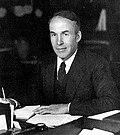The Boylston Professorship of Rhetoric and Oratory is an endowed chair at Harvard University. It was established in 1804, and endowed by the will of a Boston merchant, Nicholas Boylston. [1]
| Image | Name | Start date | End date | References |
|---|---|---|---|---|
 | John Quincy Adams | 1806 | 1809 | [2] |
| Joseph McKean | 1809 | 1818 | [2] | |
 | Edward Tyrrel Channing | 1819 | 1851 | [2] |
 | Francis James Child | 1851 | 1876 | [2] |
 | Adams Sherman Hill | 1876 | 1904 | [2] |
 | Le Baron Russell Briggs | 1904 | 1925 | [2] |
 | Charles Townsend Copeland | 1925 | 1928 | [2] |
 | Robert S. Hillyer | 1937 | 1944 | [2] |
| Theodore Spencer | 1946 | 1949 | [2] | |
 | Archibald MacLeish | 1949 | 1962 | [2] |
| Robert Stuart Fitzgerald | 1965 | 1981 | [2] | |
 | Seamus Heaney | 1984 | 1995 | [2] [3] |
 | Jorie Graham | 1999 | 2025 | [4] [5] |
 | Tracy K. Smith | 2025 | [6] |